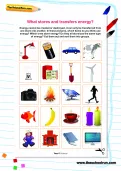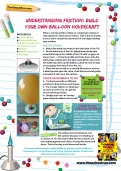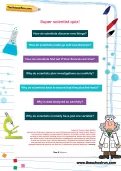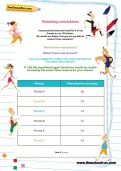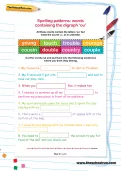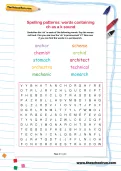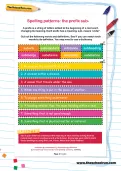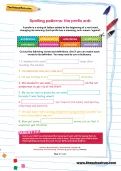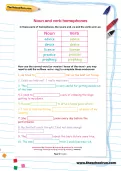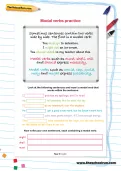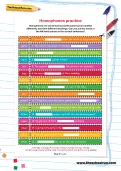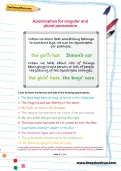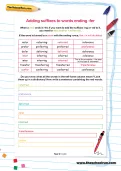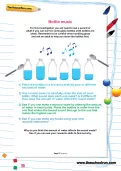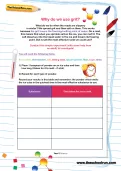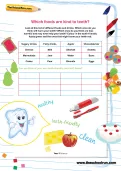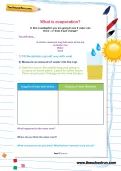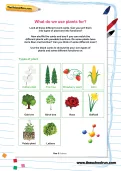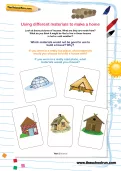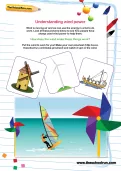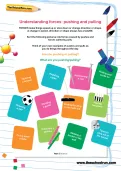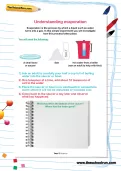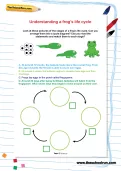All these words contain the letters ‘ou’ but make the sound /u/, as in umbrella. Cut the words out and put them into the following sentences where you think they belong.
or
Register to add to your saved resources
Already a subscriber? to view this content.
Underline the ‘ch’ in each of the following words. Say the words out loud. Can you see how the ‘ch’ is pronounced /k/? Now see if you can find the words in a wordsearch.
or
Register to add to your saved resources
Already a subscriber? to view this content.
A prefix is a string of letters added to the beginning of a root word, changing its meaning. Each prefix has a meaning; sub- means ‘under’. Cut out the following words and definitions. See if you can match each words to its definition.
or
Register to add to your saved resources
Already a subscriber? to view this content.
A prefix is a string of letters added to the beginning of a root word, changing its meaning. Each prefix has a meaning; anti- means ‘against’. Cut out the following words and definitions. See if you can match each words to its definition.
or
Register to add to your saved resources
Already a subscriber? to view this content.
A Year 6 English worksheet created by an experienced teacher to help your child learn about noun and verb homophones.
or
Register to add to your saved resources
Already a subscriber? to view this content.
A fun Year 5 English worksheet made by a teacher to help primary-school children understand modal verbs. It includes examples and activities to make learning about modal verbs enjoyable and engaging.
or
Register to add to your saved resources
Already a subscriber? to view this content.
Homophones are words that sound the same but are spelled differently and have different meanings. Can you put the words in the left-hand column in the correct sentences?
or
Register to add to your saved resources
Already a subscriber? to view this content.
This Year 4 English worksheet was created by an experienced primary school teacher to help your child understand and practise using apostrophes for singular and plural possession.
or
Register to add to your saved resources
Already a subscriber? to view this content.
A Year 6 English worksheet created by an experienced educator to teach your child about adding suffixes to words ending -fer.
When a verb ends in -fer, if you want to add the suffixes -ing or -ed to it, you need to add another r at the end. If the word is turned to a noun with the ending -ence, the r is not doubled. Now see if you know what all the words in the left-hand column mean. Can you write a sentence containing the red words?
or
Register to add to your saved resources
Already a subscriber? to view this content.
For this investigation you will need to ask a parent or adult if you can borrow some glass bottles (milk bottles are ideal). Remember to be careful when handling glass and ask an adult to help you clean the bottles first.
or
Register to add to your saved resources
When the roads are slippery in winter we spread grit and then salt on them. But is salt the most effective solid we could use? Conduct this simple experiment to investigate!
or
Register to add to your saved resources
Already a subscriber? to view this content.
Look at this list of different foods and drinks. Which ones do you think will harm your teeth? Which ones do you think are less harmful and may even help your teeth? Colour in the tooth-friendly foods green and the ones that might harm your teeth red.
or
Register to add to your saved resources
Already a subscriber? to view this content.
Energy cannot be created or destroyed, it can only be transferred from one store into another. In these pictures, which items do you think use energy? Which ones store energy? Do they all store/use the same type of energy? Cut them out and sort them into groups.
or
Register to add to your saved resources
In this investigation you are going to see if water can move – or does it just change?
or
Register to add to your saved resources
Look at these different word cards. Can you sort them into types of plant and into functions? Now shuffle the cards and see if you can match the different plants with possible functions.
or
Register to add to your saved resources
Already a subscriber? to view this content.
Look at these pictures of houses. What are they are made from? What do you think it might be like to live in these houses in hot or cold weather? Let's investigate which materials would not be good to use to build a house.
or
Register to add to your saved resources
Already a subscriber? to view this content.
Wind is moving air and we can use the energy in wind to do work. Look at these pictures to see how people have always used wind power to help them. How does the wind make these things work? Put the wind to work for you! Make your own pinwheel and watch it spin in the wind.
or
Register to add to your saved resources
Already a subscriber? to view this content.
Pushing and pulling FORCES make things speed up or slow down or change direction or shape. A change in speed, direction or shape always has a CAUSE. Sort the following pictures into forces caused by pushes and forces called by pulls. Then think of your own examples of pushes and pulls as you do things throughout the day.
or
Register to add to your saved resources
Already a subscriber? to view this content.
Evaporation is the process by which a liquid such as water turns into a gas. In this simple experiment you will investigate how this process takes place.
or
Register to add to your saved resources
Already a subscriber? to view this content.
Look at these pictures of the stages of a frog’s life cycle. Can you arrange them into a cycle diagram? Can you read the statements and match them to each stage?
or
Register to add to your saved resources
Already a subscriber? to view this content.
